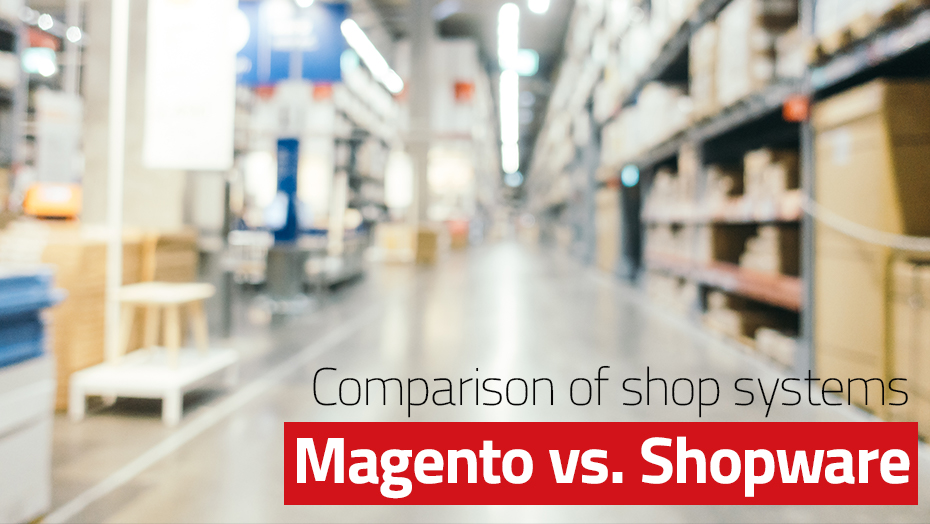
As a specialised e-commerce hoster, we cannot make a universally valid recommendation, but the following comparison may help in the decision-making process.
Requirements for a shop system
Finding the right shop system for an online shop is a challenge for every operator. Goals and target groups, structures, budget, product (variety) - every shop is unique and therefore often requires a very individual solution.
Added to this are the demands of users - both internal and external - on the online shop. While consumers increasingly expect inspiring shopping experiences that appear quickly on their screens, employees and developers often want a system that is uncomplicated to use, yet highly customisable and performant.
To find out which shop solution is the best fit, shop operators should ask themselves the following questions before making their choice:
Create a requirements profile
Assortment
- What kind of assortment is offered?
- What is the scope of the range?
- How will the product range develop (according to plan)?
Target group
- Which target group(s) should be addressed?
Markets
- Which markets are served? - Local, National, International......
Shop functions | Consumer
- What functions must be offered to users?
- What other functions would be desirable?
- How customisable does the shop have to be? Is standard enough?
Finance
- What is the projected turnover?
- How many orders are expected daily/monthly?
- What is the budget? - One-off and running costs
- Cost recovery from existing funds or from ongoing business?
- Which financing model is desired? - Rent, purchase, dual-licence model...
Employees
- How many employees are in charge of the shop?
- What IT skills do these employees have?
- Do the staff have programming skills?
- What marketing skills do you have? - SEO, Content...
Interfaces | Functions
- Which interfaces to other systems must be available?
- What functions must be available for the users?
- What other functions would be desirable?
- How high are the requirements for analysis data and reporting?
Other
- When should the shop be live?
- Own development or cooperation with agency?
- Who takes care of the hosting? - Self hosted, managed hosting, cloud hosting
Things to know about both shop systems
In this comparison, we limit ourselves to two major players in the German market: Magento 2 and Shopware. If you want to compare Magento and Shopware with other shop systems, we recommend the linked article from Developer Connection.
An evaluation with Google Trends shows that Shopware is searched for significantly more often in Germany than Magento:
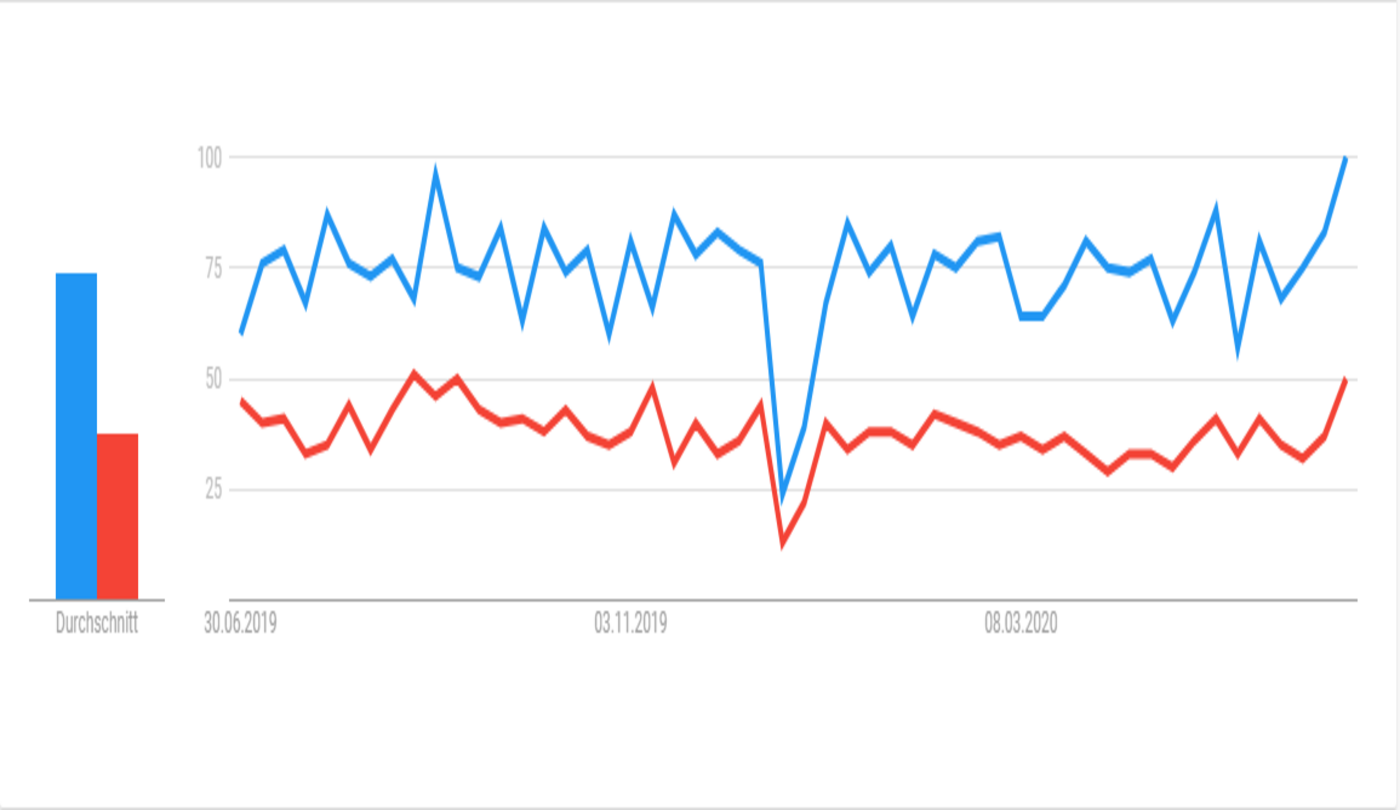 Popularity of Magento (red line) and Shopware in Germany | Source: Google Trends (29.06.2020)
Popularity of Magento (red line) and Shopware in Germany | Source: Google Trends (29.06.2020)
Globally, however, the picture looks very different:
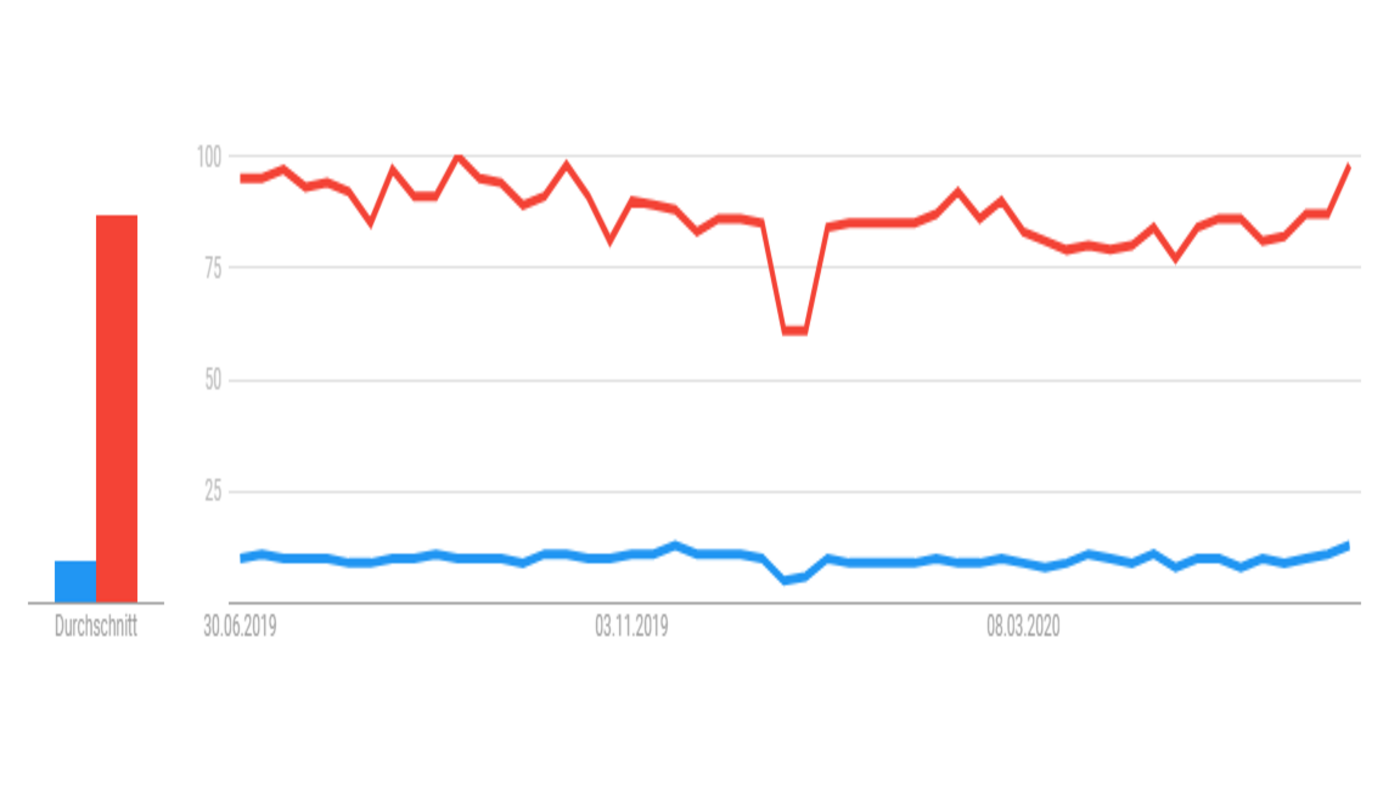 Popularity of Magento (red line) and Shopware worldwide | Source: Google Trends (29.06.2020)
Popularity of Magento (red line) and Shopware worldwide | Source: Google Trends (29.06.2020)
This is certainly also due to the history and thus the orientation of the two companies.
Magento
History
Magento was developed in the USA in 2008 by the software company Varien, which was later renamed Magento Inc. From 2011 to 2015, the company was a subsidiary of Ebay, then part of Permira's private equity investment until 2018. Since 2018, Magento has belonged to Adobe.
Versions
Magento is available in two versions: Magento 2 is the successor to Magento 1 and was released in 2015. Since 01.07.2020, Magento 1 is end-of-life, which means that no more security patches will be provided by Adobe (Note: For this reason, we focus on Magento 2 in this comparison).
Shopware
History
Shopware was developed in Germany in 2004 by Stefan Hamann. Together with his brother Sebastian, he runs the 100% equity-financed company in Schöppingen, Westphalia.
Versions
Shopware is currently available in two versions: Shopware 5 will continue to be maintained until at least 2024, according to the company. In May 2019, Shopware 6 was introduced, for which a completely new technological basis was created.
Magento 2 vs. Shopware
The decision for Magento or Shopware is a very complex one. In order to simplify this somewhat, we have listed the most important distinguishing features of both shop systems in the following comparison and described them in detail.
System
| Magento | Shopware | |
|---|---|---|
| Programming language | Framework |
|
|
| Performance |
|
|
Programming language | Framework
Magento's tech stack is composed of PHP 7.X, Symfony, Knockout.js and Laminas (formerly Zend Framework) and has a template engine. As open source software, Magento is completely modifiable, is easily extendable through events and dependency injection, and there are no encrypted modules or source code components in the system.
Shopware 6 uses the frameworks Symfony, Vue.js and Bootstrap as well as PHP 7.X and the template engine Twig. The software architecture is based on the API first principle and enables simple integration of external systems and the connection of different front-end applications, such as Alexa Skills. Whereas up until Shopware 5.5 there were still encrypted code components that could be a hindrance to customisation, in the latest version all components are open source and unencrypted.
Performance
The performance of online shops is the basis for their success. The more efficient a shop is, i.e. the faster the pages are loaded and the content is visible, the higher the conversion rates and thus the sales achieved.
Both shop systems already offer the Varnish cache in the standard versions to increase performance. In addition, both systems include CSS and JavaScript compression as well as image compression.
For an initial assessment of the differences in performance, you can refer to the following graphic, in which the same website was tested against Magento and Shopware. However, the speed of a shop is generally very dependent on the setup and maintenance of the shop.
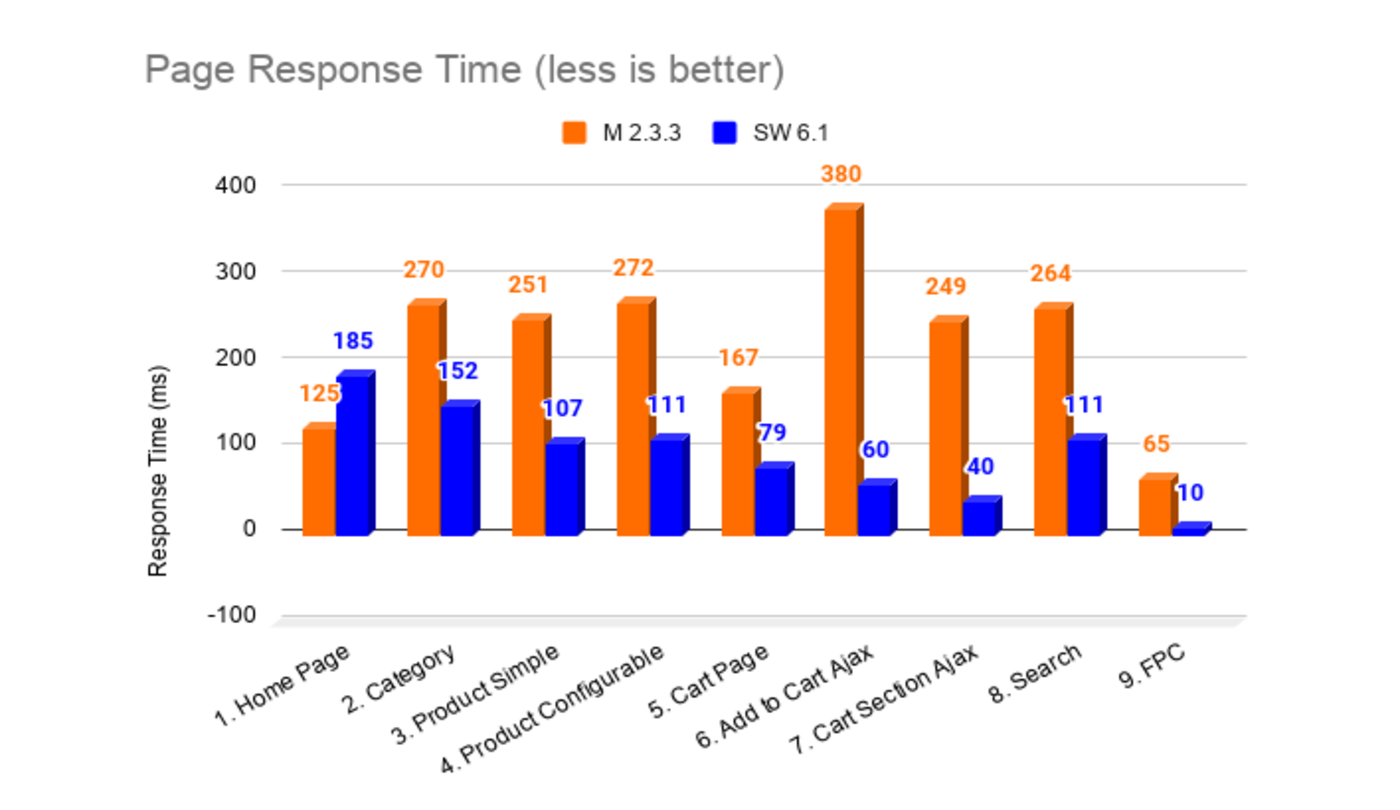 Comparison of the Page Response Time of Magento 2.3.3 vs. Shopware 6.1 | Source
Comparison of the Page Response Time of Magento 2.3.3 vs. Shopware 6.1 | Source
In any case, both systems offer a high degree of reliability and can be used without any problems even under heavy loads.
Support
| Magento | Shopware | |
|---|---|---|
| Support by manufacturer |
|
|
| Support through community |
|
|
Support by manufacturer
Personal support from the respective company is only available with both shop systems from the paid version onwards. With Magento this is only available in English (it is also sometimes difficult to contact the manufacturer directly), with Shopware only in German. While manuals and instructions are only available in English with Magento, they are available in English and German with Shopware. Shopware also has its own Wiki, which provides additional information and help. There is extensive online documentation and video tutorials for Magento.
Support through community
Magento is known for its long-standing and very connected community. More than 150,000 developers and friends of the software are available for questions in the various communication channels, such as Github and Slack, and provide support in finding the right solution to problems. Anyone looking for freelancers can find what they are looking for here.
Various events, such as Meet Magento, which takes place in different locations around the world, the unconventional German MageUnconf and Magento MeetUps in various German cities, bring the community together again and again and strengthen their bond.
As a younger company, Shopware cannot yet draw on such a large community. An estimated 40,000 developers support questions and provide assistance. In the meantime, Shopware has focused more on the community as an important pillar of support and is increasingly supporting its concerns. It is also clear that some very well-known Magento developers are also interested in Shopware. The community will therefore probably increase significantly in the coming years.
The company informs about innovations at the annual Shopware Community Day. Shopware MeetUps take place in various German cities and a ShopwareUnconf is also planned for 2021.
Frontend
| Magento | Shopware | |
|---|---|---|
| Internationality | Worldwide
| Germany, Europe |
| Shop functions | Features |
|
|
| Marketing | SEO |
|
|
Internationality
Magento is geared towards the international market, so that, for example, multi-language capability is already available in the standard version.
Shopware's target group is more likely to be found in the German/German-speaking market as well as in Europe.
This can also be seen in the following graphs from eCommerceDB:
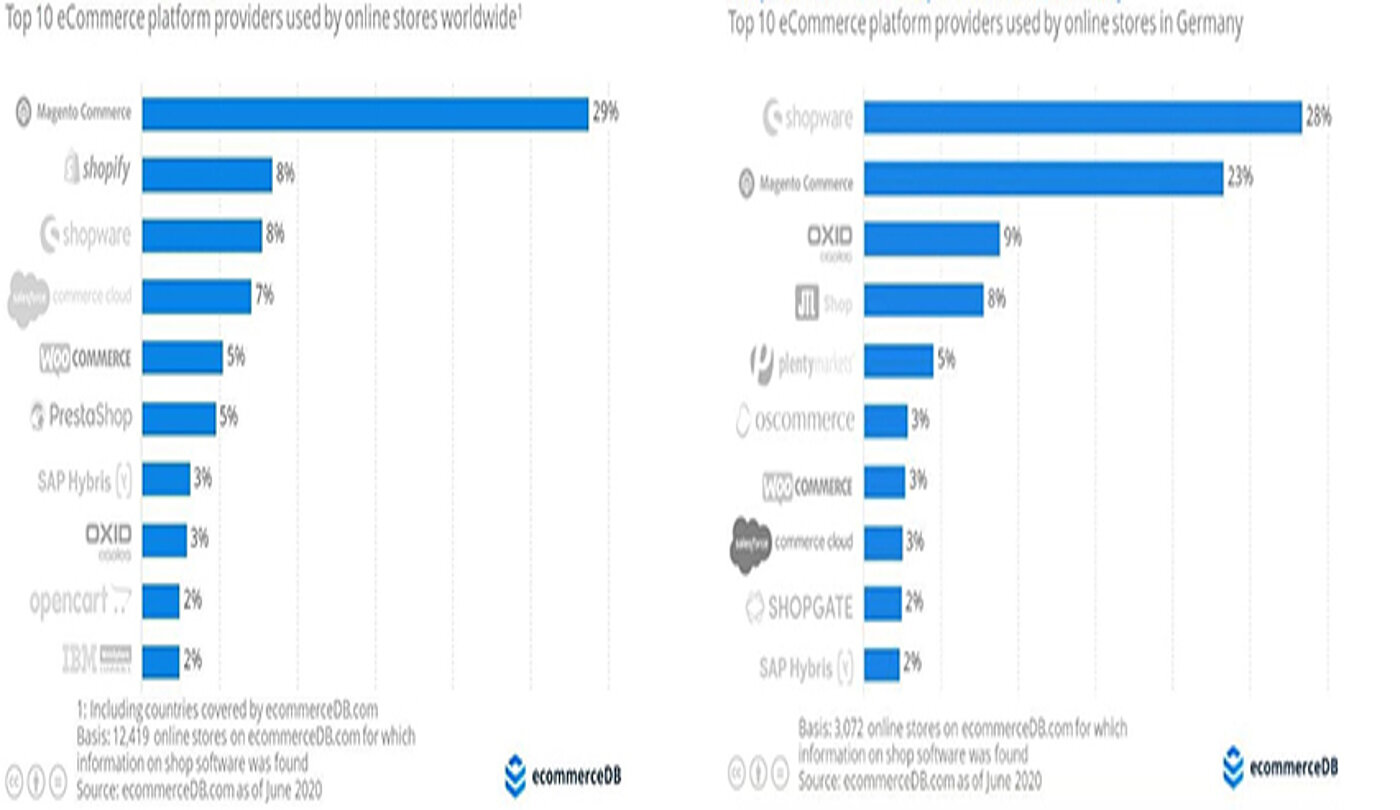
Shop functions | Features
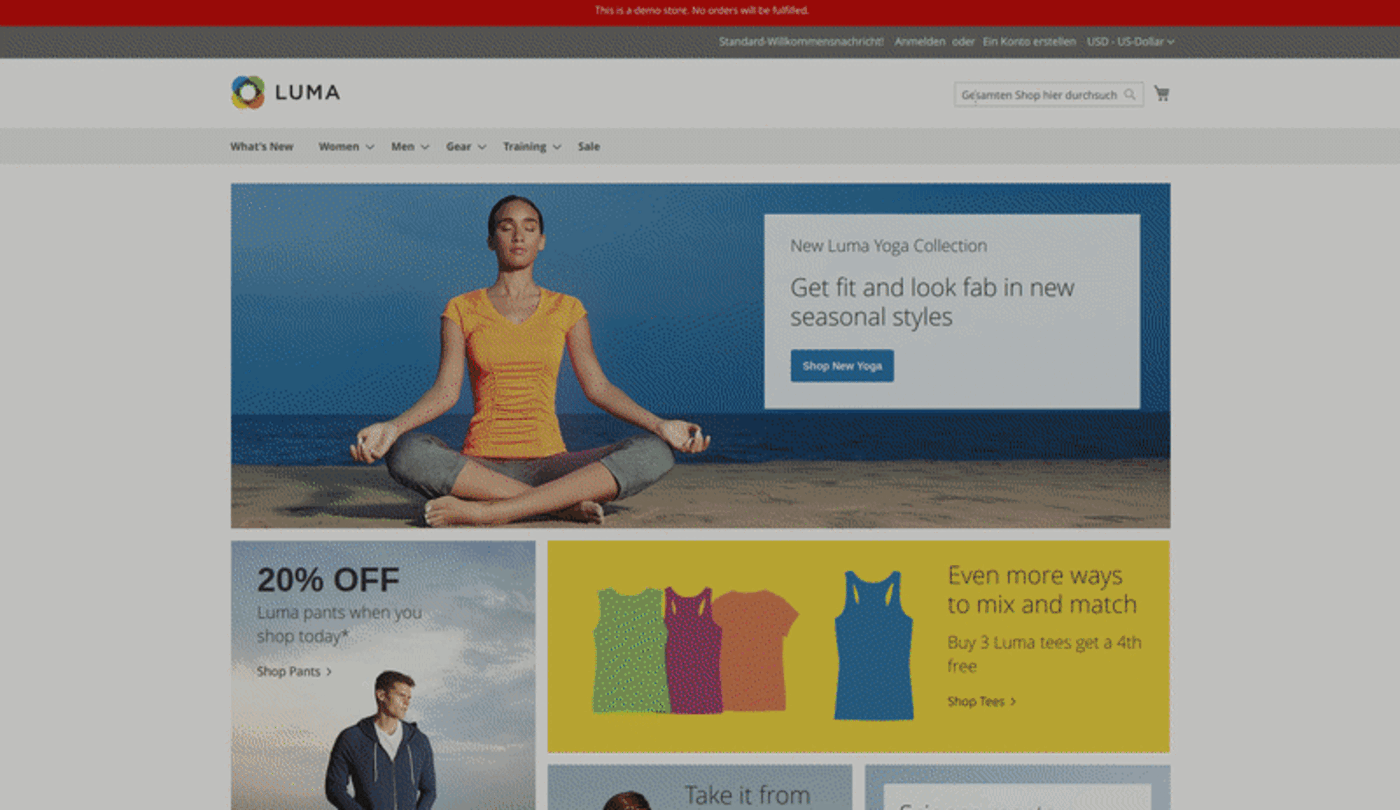 Magento frontend of the demo shop
Magento frontend of the demo shop
Magento convinces with a modern and clear frontend, but the design of the online shop depends on the installed theme. There are many themes included in the software that are also responsive. In the case of third-party themes, however, you should check in advance whether they are also suitable for use on smartphones and tablets.
In addition to the conventional product view with filter function, each product has its own sub-page with further details, such as pictures or videos and, of course, product descriptions. There are also category pages. All pages can be easily searched using the programmed search function, also with various filters.
Magento relies on a simple checkout system to make the payment process easier for customers. The information is summarised for the customer on one page and made verifiable. The shop operator has the possibility to individualise and flexibly adapt the checkout and payment process.
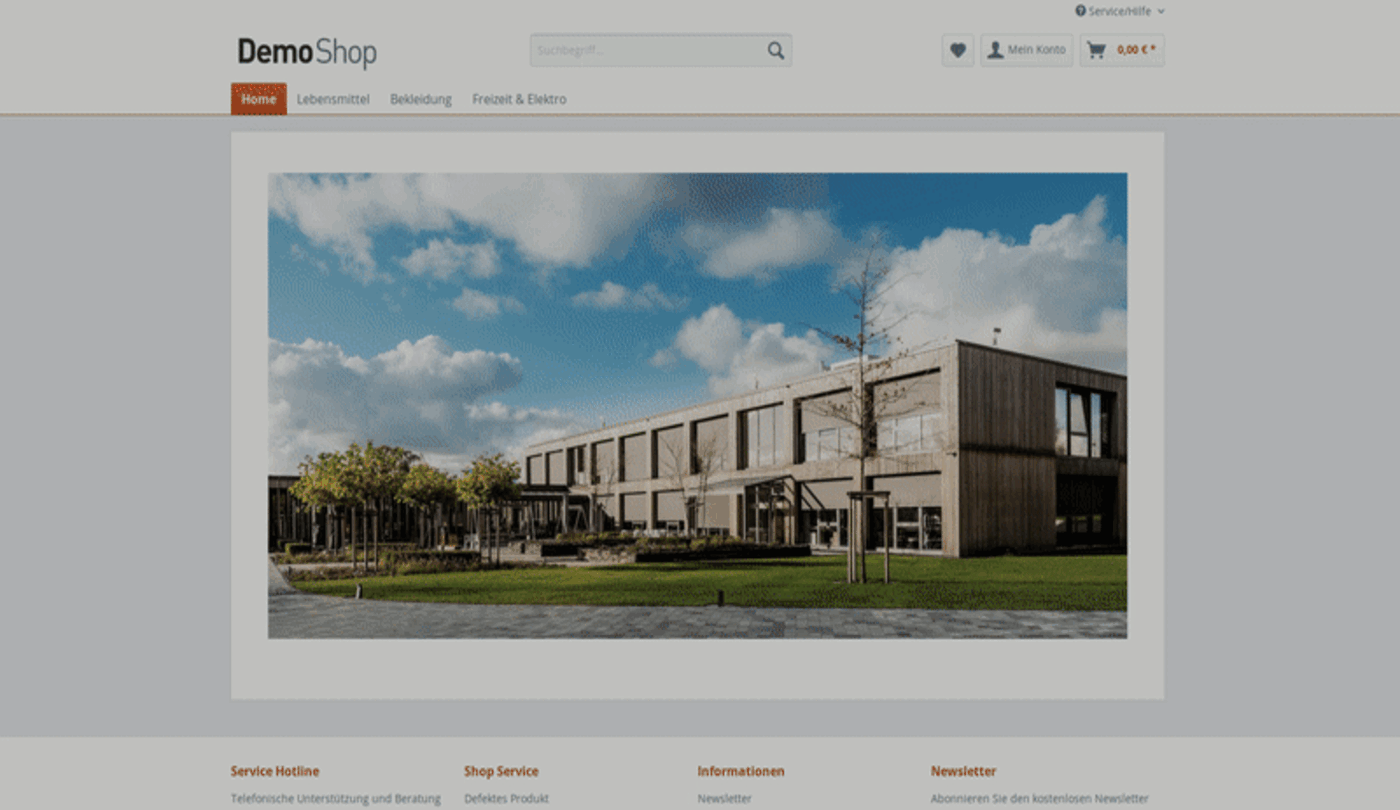 Shopware 5 frontend of the demo shop
Shopware 5 frontend of the demo shop
Shopware also has a modern frontend with the option of customising themes. The storefront works on all devices to guarantee playout on social media platforms.
The product display is clearly laid out and offers extensive filtering options, such as by properties or variants.
With Shopware, customer ratings can also be managed in the administration and displayed directly in the storefront.
The integrated Paypal module gives the shop operator access to various, worldwide payment methods as a complete payment solution, with PayPal even assuming the payment risk.
Marketing | SEO
Magento only has a simple media manager with a few basic functions. Images, videos and other media can be uploaded without any problems, but editing functions such as resizing etc. are missing. Options for email marketing, for example for newsletters, are available.
Magento does not offer any special SEO optimisation, but meta descriptions and meta titles can be entered per product in the text editor.
A connection to your own social media channels is possible via third-party extensions.
Coupons for discounts, vouchers as well as discounts for special promotions are already available in the software as "price rules".
Just as with Shopware 5, the focus of Shopware 6 is on content management and marketing - the "shopping worlds" of Shopware 5 were once again significantly expanded in the 6th version and now offer consumers "worlds of experience".
With Shopware, some of the basic settings for search engine optimisation, such as rich snippets, breadcrumbs and canonical tags, are made automatically and can then be adjusted manually.
All sales channels - including social media channels or voice commerce - can be controlled centrally with Shopware 6.
With the "Discounts & Promotions" module, promotions can be activated per sales channel and adapted to the respective target group
Backend
| Magento | Shopware | |
|---|---|---|
| Handling | Usability |
|
|
| Admin functions |
|
|
| Extensions | Templates | Out-of-the-box version
| Out-of-the-box version
|
Handling | Usability
Magento's backend is not immediately intuitive, but requires a bit of training to understand the necessary functions and processes. The maintenance of product, customer and transaction data is quite straightforward, but for more complex adjustments, some programming skills should be available. Visual adjustments also tend to require the knowledge of a developer.
Shopware's focus in the design of the backend (which is called the admin area there) is on clarity, simple and intuitive user guidance and clear navigation. In order to offer the consumer an appealing experience, various shop pages, such as landing pages as well as category and product pages, can be created simply by dragging and dropping. In addition, the corresponding content, such as images, media and products, can be designed in the backend/admin area and played out device-independently and across channels. For this purpose, the content can be managed centrally with the data set management of Shopware 6.
Admin functions
The Magento admin area offers a list view and a detail view with which items can be filtered, sorted and values or options can be configured and grouped.
Shopware uses JS Framework for its admin area, which allows the admin to work with different windows simultaneously. In addition, there are tabs to make the necessary configurations.
The following functions are available with both systems:
- Dashboard: Both Magento and Shopware offer a clear dashboard where the user can see all the information at a glance. With Shopware, additional widgets can be activated to call up more details.
- Configurations: Both solutions can be easily configured and tailored to the individual needs of the shop.
- Product magement: Both shop systems have a variety of configuration options for a product. With Magento these are displayed in an accordion view, with Shopware with tabs.
- Product list: Shopware offers the option of automatic filtering of products within the category trees. In addition, Shopware also offers a quick edit function for articles, which Magento does not have.
- Marketing features: Newsletters and reports can be created with both providers. However, real marketing functions are only available with Magento from the Enterprise Edition or through third-party modules. Shopware, on the other hand, offers a variety of integrated marketing functions, such as banner management, product and customer streams and bonus programmes. Further functions can be added through Shopware or third-party plug-ins.
- Content management: Both shop systems offer content management functions. While these functions are rather basic with Magento, Shopware offers additional possibilities such as blog modules and media managers.
By the way, both admin areas cannot be used on the move.
Extensions | Templates
Both shop systems come with an extensive out-of-the-box version. In addition, the user has access to numerous extensions and templates.
Magento is unbeatable when it comes to the number of plugins: over 10,000 plugins are available. An API is available. In addition, there are interfaces to numerous systems, such as SAP, Sage, Akeneo or Salesforce, some of which are subject to a fee.
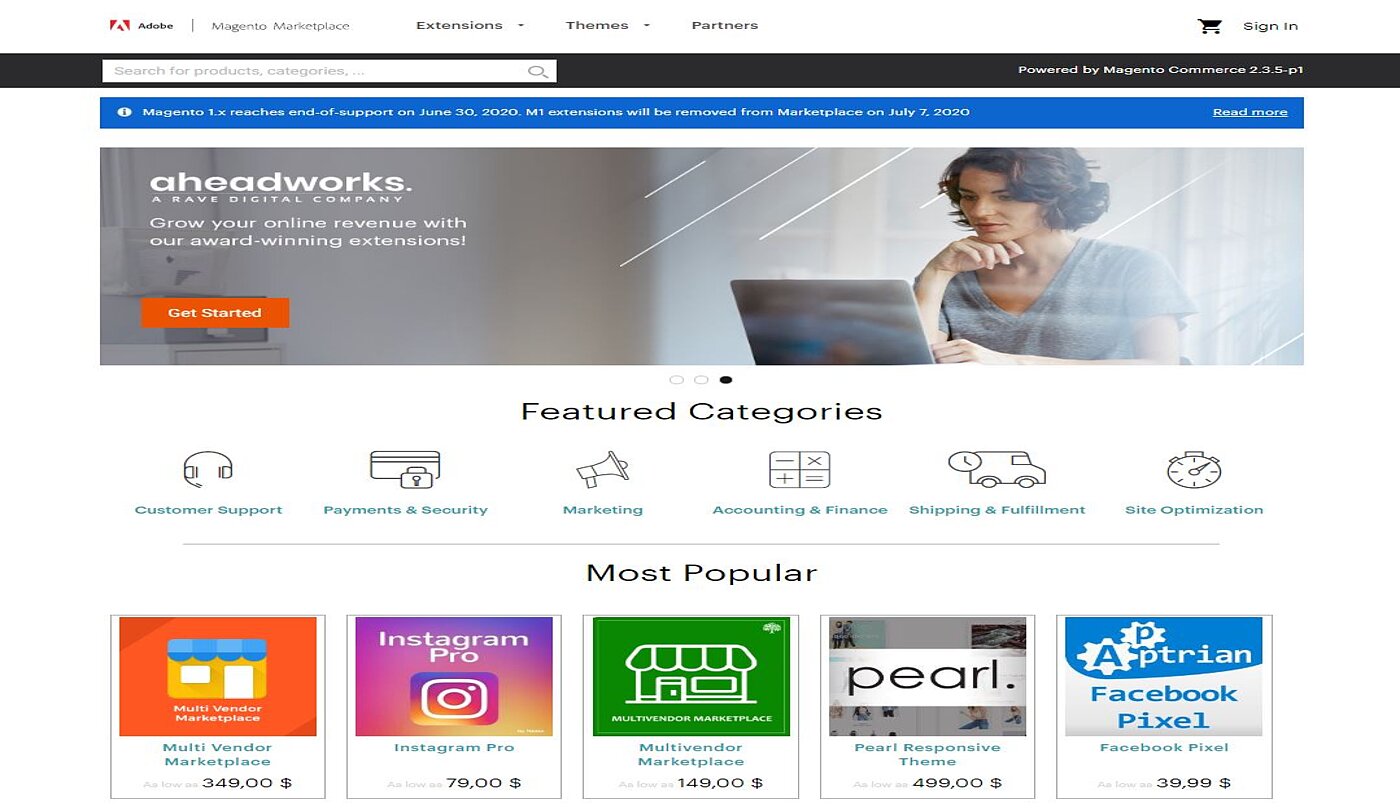 Magento Marketplace for plugins etc. | Source
Magento Marketplace for plugins etc. | Source
Shopware offers far fewer plug-ins, but there is quality control of the add-ons by Shopware. An API is available, but special interfaces have to be programmed.
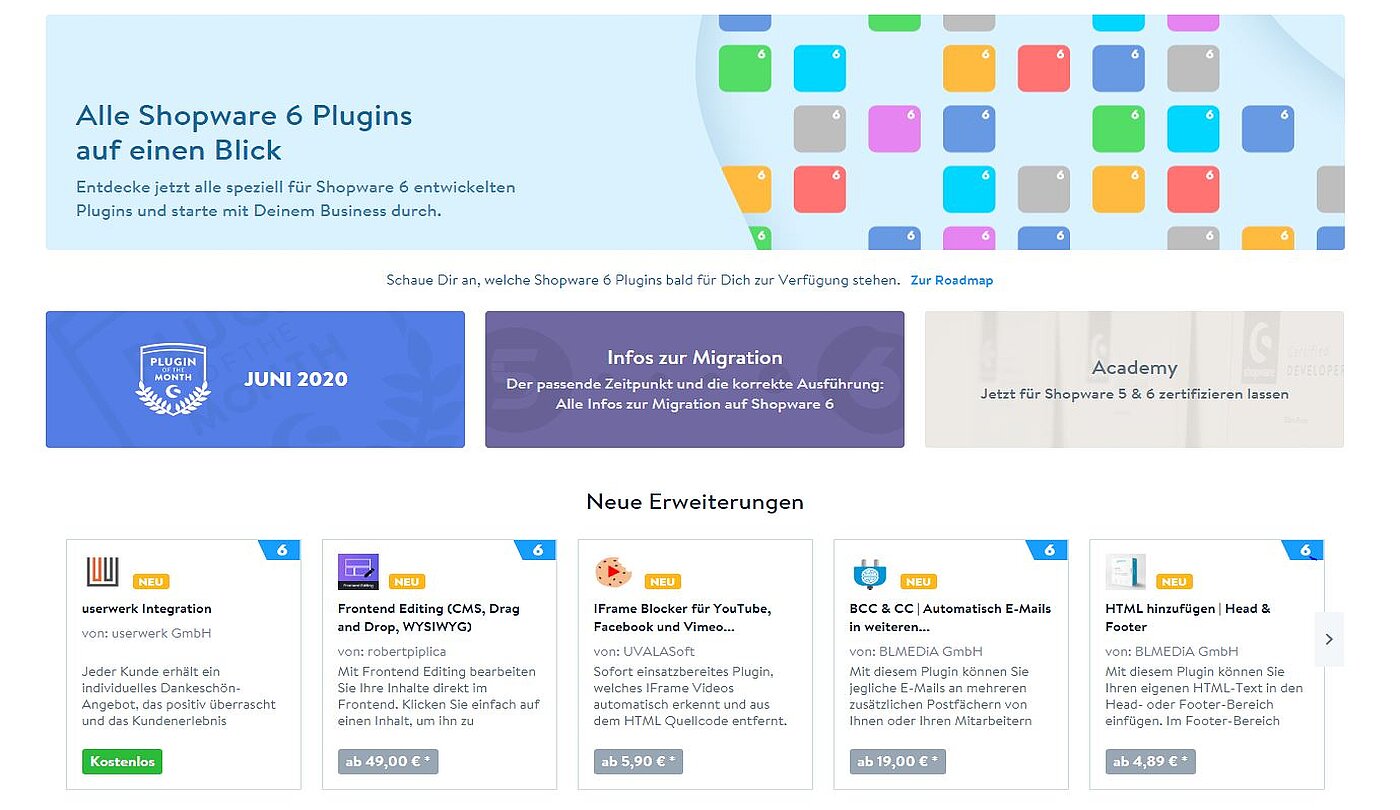 Shopware Shop for Plugins | Source
Shopware Shop for Plugins | Source
Costs
| Magento | Shopware | |
|---|---|---|
| Costs for editions |
|
|
Costs for editions
In addition to the free Community Edition, Magento 2 is available in two further variants, the costs of which depend on the expected annual turnover of the online shop:
- Community Edition: free of charge
- Magento 2 Enterprise Solution: from 22.000 $
- Magento 2 Enterprise Solution Cloud: from 40.000 $
Shopware 6 is offered in four variants with different scopes of services:
- Community Edition: free of charge
- Rise Edition: from 600 € per month
- Evolve Edition: from 2.400 € per month
- Beyond Edition: from 6.500 € per month
Information on the old Shopware pricing model
Shopware completed the changeover to the new pricing model on 15 September 2022. However, there is no acute need for action for customers of the Professional Edition and the Enterprise Edition, which are no longer offered. Current contracts for older versions will remain unchanged and no additional costs will be incurred.
- Community Edition: free of charge
- Professional Edition: 2.495 €
- Enterprise Edition: Price on request
Special features
| Magento | Shopware | |
|---|---|---|
| PWA |
|
|
| Cloud |
|
|
| Reference Customer |
|
|
PWA
With PWA Studio, Magento offers an "in-house" PWA solution, but other PWA solutions such as Vue Storefront can also be used with Magento. More information on this: https://magento.com/products/magento-commerce/pwa. The experiences of the Mothership agency in setting up their first Magento 2 PWA shop can be read here.
At Shopware, the PWA framework was designed and developed together with Vue Storefront and integrated into Shopware 6. More details can be found here: https://www.shopware.com/en/solutions/shopware-pwa/. We discussed the advantages and disadvantages of a PWA solution with Vue Storefront with the Software Development Manager of GastroHero - the interview is available here.
Cloud
With Magento Commerce Cloud for high-volume online shops and Cloud Starter for smaller shops, Magento offers its customers extended functions, better support and a highly scalable system and many other features (page builder, dynamic marketing, improved search...). The Commerce Cloud is a platform-as-a-service offering, and other services from the Adobe Experience Cloud can be added for an additional charge.
Shopware shops in the editions Rise, Evolve and Beyond can be hosted and run directly in the Shopware Cloud.
Reference customers
Magento has a long list of (international) reference customers, including companies such as Nike, Burger King, Odlo and WMF.
Shopware is more at home in the German/European market and can count retailers such as L'Oréal and Philips among its customers.
Conclusion
As the comparison shows, both shop systems are very powerful and have different strengths (and also weaknesses). Which shop system you finally choose depends on many factors, so we cannot make a clear recommendation here. With the requirements profile you can define your starting position and your goals more precisely and then compare them with the offer of the respective shop system. This may simplify your decision.
Whichever shop system you choose, our "best-practice e-commerce hosting" can be tailored to it at any time. You can also find more information on our websites for Shopware Hosting and Magento Hosting.
If you have any questions about this or need assistance with the hosting of your "new" shop, our support team will be happy to help you on 05251/414130 or by email supportmaxcluster.de.




